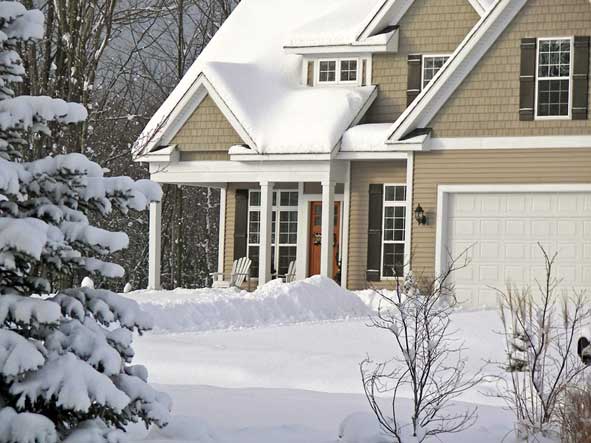Why won’t your garage keypad work in the winter? As the mercury dips and snow starts, your keypad’s reliability also drops. If your garage door won’t open, take a look at what you need to know about the impact of winter-time weather.
Is This a Garage Door Problem?
Provided there’s no other issue at hand, a faulty keypad doesn’t necessarily indicate a problem with the actual door or opener mechanism — especially in the winter. If you can open and close the door with the remote opener or from inside the garage (using the interior switch), you don’t have a true door problem.
Even though a cold keypad that won’t work properly isn’t a garage door malfunction, it can still get in the way of expected use. Read on for more information on how to diagnose and fix the issue.
Is the Keypad Definitely the Problem?
Before you assume the cold weather has caused a keypad problem, consider the other options. While a cold or frozen keypad is fairly easy to fix, other issues may require a more complex solution. This requires a professional’s assistance. Never attempt to inspect, diagnose, or repair your garage door (or opener) yourself.
It’s possible the cold weather has caused the metal in your door’s mechanism to contract. This can make parts stick and prevent it from opening correctly. Along with this type of mechanical issue, snow, ice, or icicles can also trigger the door’s sensors and stop it from closing.
Beyond these issues, excessively cold weather can also cause your entire door to freeze. Snow, ice, or sleet can freeze around the door and seal it shut. When this happens, the door may not budge, whether the keypad works or not. Never attempt to force or pry the door opener. This can damage the door or the opener mechanism. Instead, contact a professional to assess and repair the issue.
If the other opener options (the remote or main switch/button) are fully functional, and a garage door technician has ruled out other potential problems, it’s likely a cold keypad is at fault.
How Does the Cold Affect a Keypad?
Now that you know there’s no other issue, it’s time to turn your attention to the garage door keypad. If you’ve already called a qualified professional, the garage door service technician will inspect the keypad and determine if there’s damage, wear, or another problem.
Did the technician determine cold is the issue? If so, the most likely culprit is the battery. Battery-operated keypads can shut down when the temperature falls. This is due to cold’s affect on the chemical reaction required for the batteries to work.
Cold batteries tend to discharge quickly. The cool temperature also slows the chemical reaction needed for the batteries to function. Given that your keypad is located outside of your garage door (in the elements), it’s possible the weather will cause the batteries to run down in less time than they would in the spring or summer months.
Even though new batteries may work better than older ones, freezing temperatures may still make them fail quickly. You may need to replace your batteries more than once over the course of the winter. If you need to constantly change the batteries or the keypad won’t work after you make the swap, the opener may have another problem.
Along with cold batteries, frozen wiring can also cause keypad failure. While a battery replacement is an easy job for most homeowners, wiring isn’t. Don’t open the keypad or attempt to fix frosty or frozen wiring. A garage door technician has the expertise and equipment necessary to make the correct diagnosis and repair.
Did your keypad stop working? Contact Raynor Door Company for more information.


